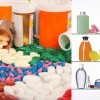Resumen
Pharmaceuticals and personal care products contain a variety of chemical substances that enter household wastewater from bath and shower, sinks, and washers and ultimately find their way into the environment. Continuous discharge of wastewater contributes to the accumulation of these substances in the environment — where they can be harmful to organisms. This publication is part of a series titled Contaminants in the Urban Environment. This series is intended to give state and local government officials, soil scientists, consulting engineers, extension agents, and citizens (1) a basic understanding of the occurrence, toxic effects, and source of various contaminants in the environment and (2) guidance on ways to protect human and environmental health. This 5-page fact sheet provides an overview of the use and sale of PPCPs in the United States and the world. Written by Yun-Ya Yang and Gurpal S. Toor, and published by the UF Department of Soil and Water Science, March 2015.
Citas
Gu, Q., C. F. Dillon, and V. L. Burt. 2010. "Prescription Drug Use Continues to Increase: U.S. Prescription Drug Data for 2007-2008." NCHS Data Brief, no 42. Hyattsville, MD: National Center for Health Statistics. https://doi.org/10.1037/e665492010-001
IMS Institute for Healthcare Information. 2013. Accessed December 2, 2013. http://www.imshealth.com/.
Lindsley, C.W. 2017. New 2016 Data and Statistics for Global Pharmaceutical Products and Projections through 2017. https://doi.org/10.1021/acschemneuro.7b00253
Muson, S.E., and T.G. Townsend. 2009. Pharmaceutical compound content of municipal solid waste. Journal of Hazardous Materials 162:730-735. https://doi.org/10.1016/j.jhazmat.2008.05.089
National Center for Health Statistics. 2013. Health, United States, 2012: With Special Feature on Emergency Care. Hysttsville, MD.
Rexam PLC. 2011. Packaging Unwrapped: Rexam Consumer Packaging Report 2011/12. Accessed January 26, 2015. http://www.rexam.com/files/pdf/packaging_un- wrapped_2011.pdf.
Wilson, B. S., V. H. Smith, F. DeNoyelles, and C. K. Larive. 2003. "Effects of three pharmaceutical and personal care products on natural freshwater algal assemblages." Environ- mental Science and Technology 37: 1713-1719. https://doi.org/10.1021/es0259741

